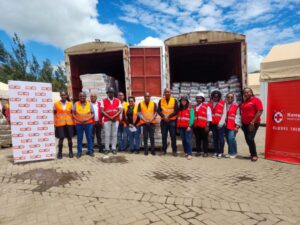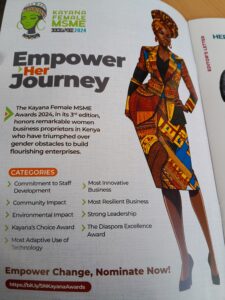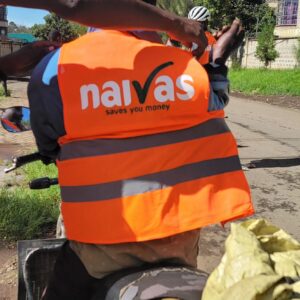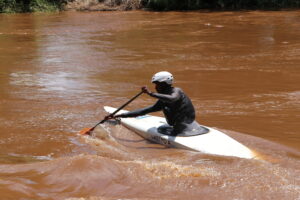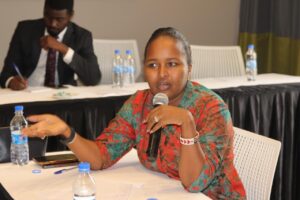By AGGREY OMBOKI
Tasha, who is 14, hails from Kibra. When our team met the young, bubbly teen, she walked with her mother in Kibra’s Soweto area.
Tasha, who is 14, hails from Kibra. When our team met the young, bubbly teen, she walked with her mother in Kibra’s Soweto area.
At a height slightly below 150cm, Tasha weighs 63 kg, which works out to a body mass index (BMI) of 28.05 kilograms per square meter, a score considered overweight.
She explains how she’s grown up in the bustling informal settlement, home to about 186,000 people.
“Going to school is always fun because my parents would give me lunch money. I would use this money to buy the tasty snacks I wanted,” she says.
For Tasha, the favorite snacks on her street food list included French fries, popularly known as chips in Kenya, smokies, sausages, and small-sized juices with different flavors such as passion, strawberry, samosas, and ice cream.
“During short and long lunch breaks, I would happily stuff myself with whatever treat I could afford with the lunch money,” she said.
Things began to get tricky when she began to experience tiredness whenever she had to play games with schoolmates, which included running, skipping rope,, or taking part in soccer matches.
“I would huff and puff, and be forced to take breaks in between the activities,” she said.
Her worried mother took her for tests during a free clinic hosted by a non-governmental organization in Kibra during the 2023 World Heart Day.
“I was told that my daughter is obese, and also advised to take tests, which resulted in a diabetes diagnosis,” says her mother, Selina.
The diagnosis came as a shock, but it forced the teenager’s family to make hard choices.
“We had to switch from a diet of sugary, salty, and fatty snacks to more wholesome foods, and also embrace an exercise regimen,” she explains.
According to Ms. Jane Mangwana, who works with the African Population and Health Research Centre (APHRC), cases like Tasha’s are not unique.
“Gone are the days when NCDS like hypertension, cancer, and diabetes were seen as diseases of the rich. We are at that point where they are increasingly showing up in economically challenged families and resource-scarce settings,” she says.
The latest Kenya Demographic and Health Survey (KDHS) data has shown an upward trend in overweight and obesity prevalence, rising from 25% in 2002 to 33% in 2014, and 49% in 2022. This increased prevalence is the proportion of a population with a disease or particular condition at a specific point in time.
By 2022, a World Health Organization report indicated that an estimated 37 million children under the age of 5 were overweight globally. Once considered a high-income country problem, overweight is on the rise in low- and middle-income countries. In Africa, WHO reports that the number of overweight children under 5 years has increased by nearly 23% since 2000.
According to Dr. Catherine Karekezi of the Non-Communicable Disease Alliance of Kenya (NCD Alliance), unhealthy diets are the biggest contributor to NCD prevalence in the country. She also names sedentary lifestyles that prevent people from regularly exercising as another major factor in the development of NCDs.
“Obesity and overweight due to unhealthy diets with high levels of refined sugar, salt, and fat, as well as sitting down for long hours without physical activity, can drive the onset of NCDs,” the pharmacist, medic, researcher, and healthy lifestyle advocate says.
Speaking at a recent media roundtable hosted in Nairobi by the NCD Alliance to focus on the APHRC study findings, she noted that an NCD diagnosis does not have to be a death sentence for Kenyans.
The NCD Alliance is actively involved in creating awareness about the threat posed by lifestyle diseases and recently completed a workshop for 250 women from Kiambu County. It is expected that they will use the knowledge gained from the event to empower their communities.
Dr. Karekezi is advising diabetics and high blood pressure patients to adopt healthy diets to supplement their medication regimen. She is also cautioning that climate change can lead to more people falling ill.

“NCDs like chronic obstructive pulmonary disease (COPD), can also be triggered by changes in air quality due to pollution,” she adds.
In an increasingly consumerist society where Kenyans are often bombarded with enticing images and sounds of refined foods, what options do consumers have in their quest to ensure that they purchase healthy and wholesome foods?
Front-of-pack food labels (FoPLs) are simplified symbols placed on packaged food products to offer consumers clear and quick information about nutritional content.
Dr. Shukri Mohamed of the APHRC says that the FOPL symbols are the most effective system to improve Kenyan consumers’ knowledge of sugar, salt, fats, and saturated fat levels in packaged foods.
“There is research evidence showing that FoPLs improve product selection and purchases, and improve knowledge and the ability to identify healthier food products. FoPL on pre-packaged foods and beverages can provide quick and easy-to-understand information for consumers at the point of purchase, allowing them to distinguish between healthy and unhealthy food and drink options,” Dr. Mohamed says.
These labels facilitate informed product choices, improve knowledge about healthier food options, and aid in distinguishing between healthy and unhealthy choices. This is crucial in Kenya, where diet-related non-communicable diseases (NCDs) like high blood pressure, stroke, heart disease, diabetes, and cancer are prevalent, especially among women.
In Kenya, NCDs cause a significant economic impact on households by decreasing 28.6% of household income on average and subjecting families to catastrophic expenditures that force them into the downward spiral of a vicious cycle of poverty.
Between October and December 2023, APHRC undertook interviews and a randomized controlled trial (RCT) to gauge consumers’ ability to assess the healthiness of food using three symbols: the red and Green Octagon (RG), Red and Green with icons Octagons (RGI), and Warning Label (WL) Octagon.
These symbols were suggested by a Ministry of Health-led technical committee responsible for crafting the Front-of-Pack Labeling (FoPL) standard for Kenya. Additionally, 12 focus group discussions (FGD) were conducted in four focus counties (Kisumu, Nairobi, Mombasa, and Garissa) to delve into consumer perceptions and comprehension of the proposed FoPLs.
APHRC’s study encompassed 2,198 consumers drawn from supermarkets and minimarts in the focus counties, selected to represent both rural and urban demographics. The study aimed to ascertain consumers’ ability to accurately identify foods with high nutrient content and to recognize unhealthy foods based on the provided symbols.
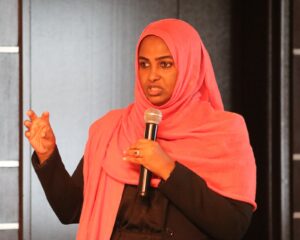
Research findings revealed that approximately two-thirds (64.3%) of the study participants were aware of back-of-pack food labels, with 55% indicating that they perused nutrition information before making purchases.
Reasons cited for not reading nutritional information included lack of time (24.0%), difficulty comprehending label information (8.4%), and ignorance (52.0%).
The primary source of information was reading product labels (42%), with 19.34% obtaining updates from the media. Respondents who correctly interpreted the labels were less likely to buy products with high levels of sugar, salt, and other nutrients of concern.
However, Dr. Mohamed emphasized that the ability of some consumers to read product labels does not guarantee informed purchasing decisions.
“It’s commendable that people read food product labels, but whether or not they comprehend what they read is a separate matter. Some of the information on the labels may only be understandable to individuals with a background in nutrition and therefore possess knowledge on the subject,” she says. She recommends more investment in public awareness creation to empower consumers with the correct product information for refined foods.
According to the Kenya Non-Communicable Diseases and Injuries Poverty Commission Report, interventions to mitigate the impact of NCDs would require 17% of total health expenditure, or $11.97 per capita annually. This represents an almost three-fold increase in current NCD expenditure. FoPLs can be a solution to improve consumer understanding of the foods they eat and guide them towards healthier choices.
She further points out that the country’s public health policy could benefit from FOPL by restricting the marketing of food products to children, implementing regulatory fiscal policy measures like an increased tax on sweeteners, sugary beverages, and food products containing certain preservatives, and providing subsidies for public institutions like hospitals, schools that serve natural foods to the public.
“Enforcement of FOPL could also compel industries to reformulate their products and comply with public health and food industry regulations. This will result in a healthier array of product purchase options for Kenyans,” she concludes.


